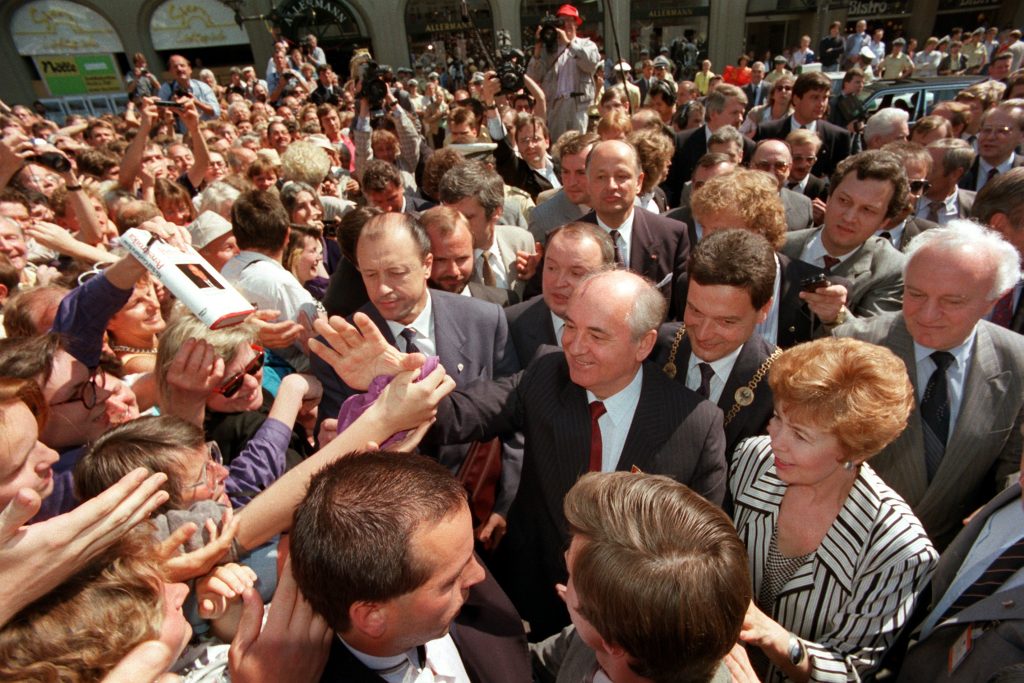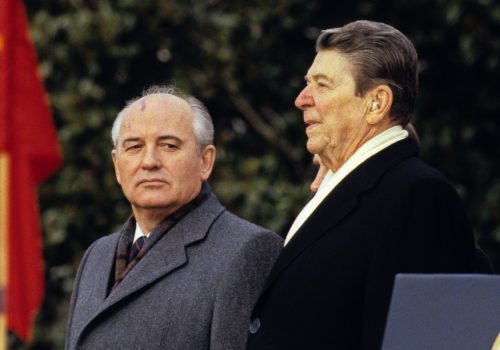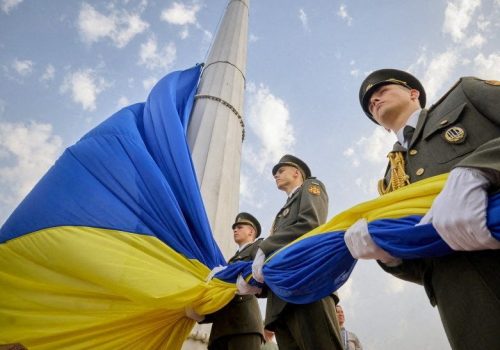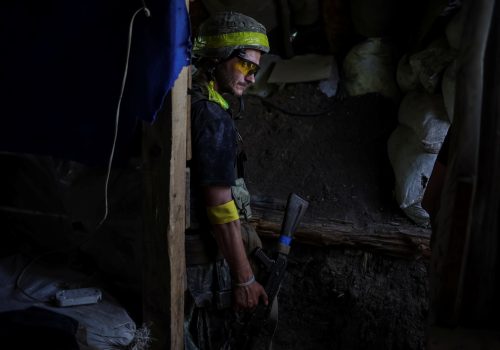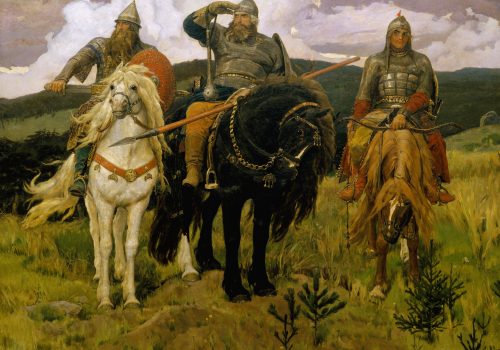The last premier of the Soviet Union has died.
A complicated figure who succeeded in ending the Cold War but failed to save his own country from collapse, Mikhail Gorbachev, who died on Tuesday at the age of 91, will likely be remembered more fondly abroad than at home. That’s especially the case as Russia increasingly turns away from the brand of democracy he sought to promote during the Communist empire’s twilight years.
Atlantic Council experts with hands-on experience working with—or even living in—Gorbachev’s Soviet Union weigh in on what his legacy means for the world.
Click on a link to jump to an entry:
Daniel Fried: Gorbachev could have taken Putin’s road. But he wanted better.
Alexander Vershbow: Gorbachev was smart enough to learn from his mistakes
Thom Shanker: Without Gorbachev, Reagan wouldn’t have won the Cold War
Paula Dobriansky: Gorbachev supported a peaceful end to the Soviet empire
John Herbst: Gorbachev was no saint, but showed just enough restraint
Gorbachev could have taken Putin’s road. But he wanted better.
There was plenty of bad in Mikhail Gorbachev’s life’s work. He served the USSR, the evil empire built on lies and mass death. His own decisions included attempts to repress the national and democratic independence movements in the Baltics.
And yet.
Gorbachev, who has died after a long illness at the age of 91, could have drowned the forces of national independence—in Poland and elsewhere in Central Europe in 1989 and in the Baltics in 1991—in blood, or tried to. He could have summoned the dark power of Russian fascism, as we see Vladimir Putin doing against Ukraine.
But he did not. He wanted something other than Stalinist violence and mass repression, something better than the gulag. He tried to make his country, the Soviet Union, a better place—more honest, more open, more decent, and thus more successful by standards other than those of reactionary tsars and Communist commissars.
Gorbachev was a reformer, not a revolutionary like Poland’s Lech Walesa or even Gorbachev’s successor in the Kremlin, Boris Yeltsin, both of whom tried and succeeded in overthrowing their country’s existing order, with good results in Poland and mixed results in 1990s Russia. Gorbachev had a different ambition: He seemed to acknowledge the rot—political and economic—that was corroding the Soviet system by the 1980s and wanted to save the USSR by reforming it. He aimed to draw on the discarded strategies of past Soviet reformist ideas that he could argue, to his comrades and perhaps himself, were socialist and Soviet but would modernize the country, making it competitive with the West.
For this strategy to work, he needed a better relationship with the West and especially the United States. So he reached out to presidents Ronald Reagan and George H.W. Bush. He refrained from crushing Poland’s Solidarity movement when it swept into power in 1989 and from reinvading Czechoslovakia when dissident Vaclav Havel became its president and from using the 300,000-plus Soviet troops in East Germany to prop up the Berlin Wall.
Gorbachev wanted something different. Something better.
What he wanted was not possible. Soviet Communism could not be reformed. The Soviet empire could not be maintained, even with Gorbachev’s implicit promises of giving it a human face. So his efforts failed, and the USSR collapsed.
Gorbachev was neither liberator nor liberal. But the consequences of what he set out to achieve, of the reforms he put in motion, made better things possible for Russia, for Ukraine, and for the peoples of the many “captive nations” who had a window to liberate themselves and took it.
Putin’s violence at home and abroad shows us the road Gorbachev might have taken, the road Josef Stalin would have taken. Gorbachev couldn’t bring himself to take that road. He was too decent, in the end. Decency, a sense of limits, and a sense of right and wrong are nothing to sneer at or take for granted.
Rest in peace, Mikhail Sergeyevich Gorbachev.
—Daniel Fried is the Weiser Family distinguished fellow at the Atlantic Council and was the coordinator for sanctions policy during the Obama administration, assistant secretary of state for Europe and Eurasia during the Bush administration, and senior director at the National Security Council for the Clinton and Bush administrations.
Gorbachev was smart enough to learn from his mistakes
Mikhail Gorbachev, who rose to power as a loyal functionary in the Soviet system, showed the world—and his own people—that a different kind of country was possible: a more open, democratic one that places the freedom and welfare of its own people ahead of maintaining a repressive empire at home and in Eastern Europe. Although he unleashed forces that he was ultimately unable to control, history will always recognize Gorbachev’s pivotal role in peacefully ending the Cold War, unifying Germany, and significantly reducing nuclear and conventional weapons.
I was director of the State Department’s office of Soviet Union Affairs during Gorbachev’s final three years in power, right up until the failed coup in August 1991. For me, a child of the Cold War, this was a very exciting time, and every day brought changes that would have been unthinkable under the Soviet system: an end to censorship and the establishment of independent media; filling in the dark pages of Soviet history (which included the publication of the Secret Protocol of the Molotov-Ribbentrop pact splitting up Soviet and Nazi influence across Eastern Europe); the establishment of rival political parties and competitive elections; and the emergence of private businesses (including even McDonald’s and Pizza Hut).
Prominent dissident Andrei Sakharov and others who had been languishing in the GULAG labor camp system returned to Moscow and became political leaders in the newly democratic Soviet parliament. Thousands of Jewish refuseniks, after waiting for decades, were allowed to emigrate to Israel or the United States. Gorbachev, the Communist Party leader, declared that individual liberty and human rights were universal values, not just Western ones. He now welcomed Western ideas and assistance—seemingly recognizing that an open economy and a vibrant civil society were the keys to his country’s own future, not just something to please or mimic the West.
Of course, Gorbachev never fully escaped his Soviet upbringing. During the 1986 Chernobyl nuclear disaster, his government initially suppressed information rather than practicing glasnost, one of his keystone ideals. And when Lithuania declared independence in 1990, his initial response was to use military force to block its path. But unlike today’s Russian leaders, Gorbachev was smart enough to learn from his mistakes; understanding the power of freedom, he made the right choice in accepting the break-up of the Warsaw Pact and, two years later, the peaceful dissolution of the Soviet Union itself.
For these decisions, Gorbachev is now vilified and demonized in Russia as Putin seeks to discredit democracy, restore the Russian empire, and re-subjugate Ukraine to Russian domination. But having spoken with Gorbachev during my time as US Ambassador to Russia, I know he remained proud of those decisions to the very end. Someday, future generations of Russians will also appreciate his legacy.
—Alexander “Sandy” Vershbow is a distinguished fellow at the Scowcroft Center for Strategy and Security and Eurasia Center. He served as the deputy secretary general of NATO and as US ambassador to Russia, among other roles.
Without Gorbachev, Reagan wouldn’t have won the Cold War
(Note: This is an excerpt of a full piece that can be found here.)
When I asked Gorbachev about the many obituaries of US President Ronald Reagan, his former US adversary, that included repeated accolades about Reagan winning the Cold War, Gorbachev paused, then spoke again in that recognizable (and sometimes caricatured) southern Russian accent of his native Stavropol.
“He had the foresight and the wisdom and the commitment to step over all of that, and start changing relations with the Soviet Union,” Gorbachev said. “We had the same wish, and we were able to do that.”
But, Gorbachev repeated, “He, himself, could not have changed the situation alone.”
The late Soviet leader was the essential partner, basing his new thinking on Soviet policy around the idea that cooperation with Washington, not confrontation, was the key to pushing ahead with his reforms at home. In the months before revolution swept Eastern Europe and the Berlin Wall came down, Gorbachev would not give his blessing to quashing protests with force. After all, cutting loose the increasingly unmanageable Warsaw Pact would ease a huge strain on the Soviet budget.
In the end, his decisions amounted to a strategic Kremlin retreat from Eastern Europe and led to the eventual collapse of the Soviet Union itself. Gorbachev did that, not Reagan.
—Thom Shanker is a nonresident senior fellow at the Atlantic Council’s Scowcroft Center for Strategy and Security and the director of the Project for Media and National Security at George Washington University’s School of Media and Public Affairs.
Gorbachev supported a peaceful end to the Soviet empire
While Gorbachev came up through the Communist Party hierarchy of the Soviet Union, upon coming to power he recognized that the system was not working. He genuinely believed that, through glasnost and perestroika, he could reform the dysfunctional and failing economy and eliminate the brutal repression of the Communist system. His policies, intended to advance “socialism with a human face” instead of salvaging the Communist system, triggered democratic revolutions at home and in the near abroad.
Significantly, when the Communist regimes in Central and Eastern Europe started to collapse, he did not use force to save them. Still, in Latvia and Lithuania, he will be long remembered as having dispatched tanks to suppress the opposition. But Gorbachev will also be remembered as having ultimately supported a peaceful transition and end to the Soviet empire, including the historic reunification of Germany and the tearing down of the Berlin Wall.
—Paula Dobriansky is the vice chair of the Atlantic Council’s Scowcroft Center for Strategy and Security. She served as director of European and Soviet affairs on the National Security Council during the Reagan administration and later as under secretary of state for global affairs.
Gorbachev was no saint, but showed just enough restraint
I received the news of the passing of Mikhail Gorbachev in Vilnius, where praise for the last Soviet leader is much sparser than in Washington or the capitals of Western Europe. Indeed the reaction here is a good reminder that politicians, or even statesmen, are rarely visionaries and never saints.
Gorbachev is held in high esteem in many Western capitals because he presided over the largely peaceful demise of the Soviet Union, an enterprise that his American partner, Ronald Reagan, correctly (and controversially) labeled the evil empire. Gorbachev can be credited for recognizing that the Soviet system had created a stagnant economy and an unresponsive political class, ensuring further stagnation. He set out to fix this by reforming the economy (perestroika) and introducing a policy of information openness (glasnost) that kicked a large hole in the elaborate censorship mechanism in order to allow a much franker discussion of Soviet failures and possible fixes. No visionary, Gorbachev did not realize that Soviet power was ultimately sustained by an elaborate system of lies. And glasnost served as acid that quickly ate away at that crucial pillar of the regime, first in the outer reaches of the Soviet Empire—the Warsaw Pact nations—then in the non-Russian republics of the Soviet Union, and finally in Russia itself. The result, within fewer than seven years of his coming to power in Moscow, was the dissolution of the Warsaw Pact and the implosion of the Soviet Union. But this was never his intention.
From the standpoint of his Western counterparts, Gorbachev’s response to the eventual demise of the Soviet Union was his finest hour. While neither anticipating nor seeking an end to Soviet power, he did not unleash his military or intelligence services to stop Hungary and then other countries from leaving the Warsaw Pact, or to reverse the decision by Russian President Boris Yeltsin and his counterparts from Belarus, Kazakhstan, and Ukraine to dissolve the Soviet Union. Had he done so, the casualties would have been enormous, and the Soviet Union could have limped along for years. Analysts correctly point to the violence provoked by the dissolution of Yugoslavia and conclude that Gorbachev’s restraint at that crucial juncture avoided violence on a much larger scale. For this, Gorbachev is properly praised. Watching Putin’s aggression against Georgia and war crimes in Ukraine, we can see how the ending of the Soviet Union could have been far bloodier.
Yet Gorbachev was no saint. While he did not send his troops into Hungary or the KGB to arrest the leaders who signed the Belovezha Accords dissolving the Soviet Union in December of 1991, he did use troops in January of that year to crack down on Lithuania’s move toward independence. Lithuanian Foreign Minister Gabrielus Landsbergis justly calls out Gorbachev for “the simple fact that his army murdered civilians to prolong his regime’s occupation” of Lithuania.
Gorbachev rose to the top of the vicious Soviet system. That would not have been possible if, as then Soviet Foreign Minister Andrei Gromyko said at the time, Gorbachev’s velvet glove did not conceal an iron fist. But we can still be thankful that at the most critical moment, Gorbachev realized that the time of the iron fist was past.
—John Herbst is the senior director of the Eurasia Center and a former US ambassador to Ukraine and Uzbekistan.
Further reading
Tue, Aug 23, 2022
A strong Ukraine is the best solution to Europe’s Russia problem
UkraineAlert By
Ukraine's courageous response to Putin's invasion has inspired the world but some Western leaders remain in denial over the threat posed by a hostile Russia, writes Ukrainian Defense Minister Oleksii Reznikov.
Tue, Aug 23, 2022
Six months, twenty-three lessons: What the world has learned from Russia’s war in Ukraine
New Atlanticist By
Our experts break down how this conflict has transformed not only military operations and strategy, but also diplomacy, intelligence, national security, energy security, economic statecraft, and much more.
Tue, Feb 8, 2022
Global Strategy 2022: Thwarting Kremlin aggression today for constructive relations tomorrow
Report By
How can the United States and its partners counter the Kremlin’s aggressive policies abroad while laying the groundwork for what could one day be a mutually beneficial relationship with a Russia that respects the rule of law and international norms?
Image: Mikhail Gorbachev (M) and his wife Raissa (r) in the middle of enthusiastic people in Bonn, Germany, on June 13, 1989. The Soviet state president stayed in the Federal Republic of Germany for a state visit from the 12 to the 15th of June in 1989. (Frank Kleefeldt/DPA Picture Alliance via Reuters)
